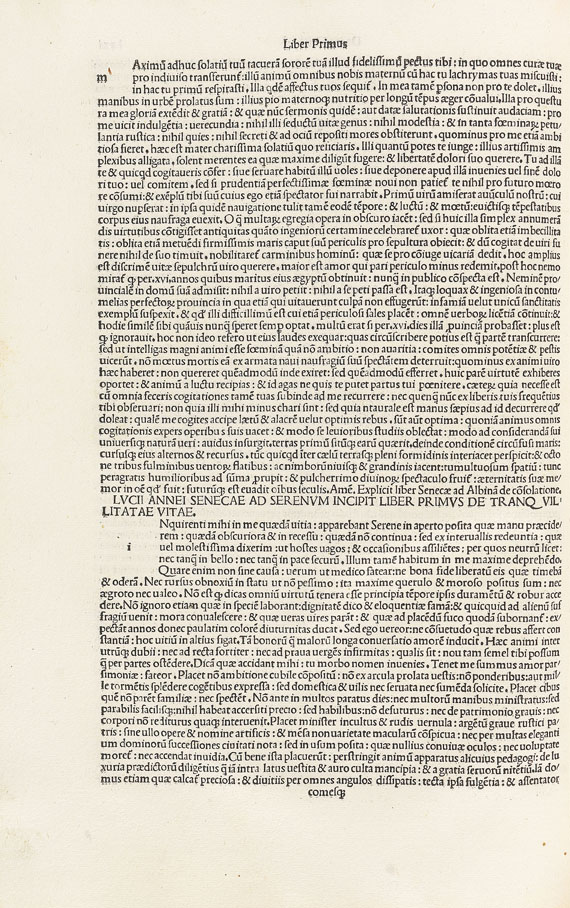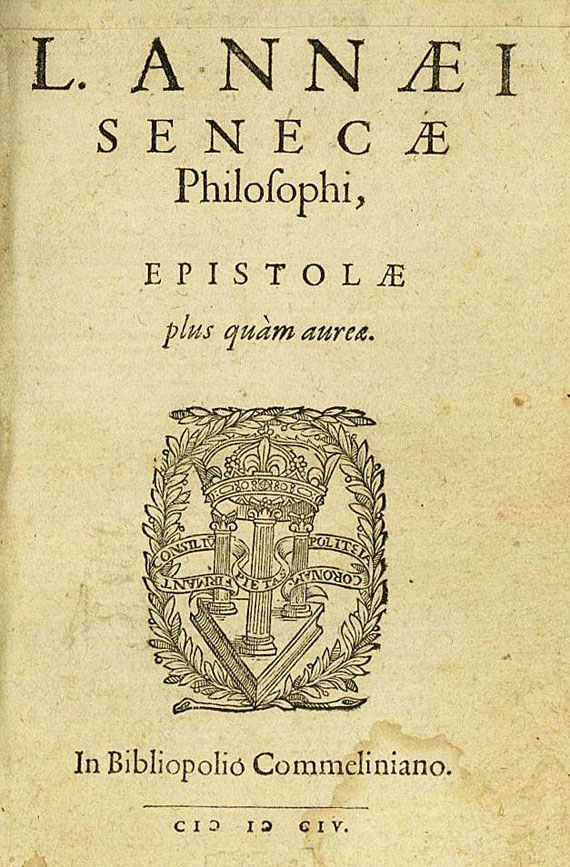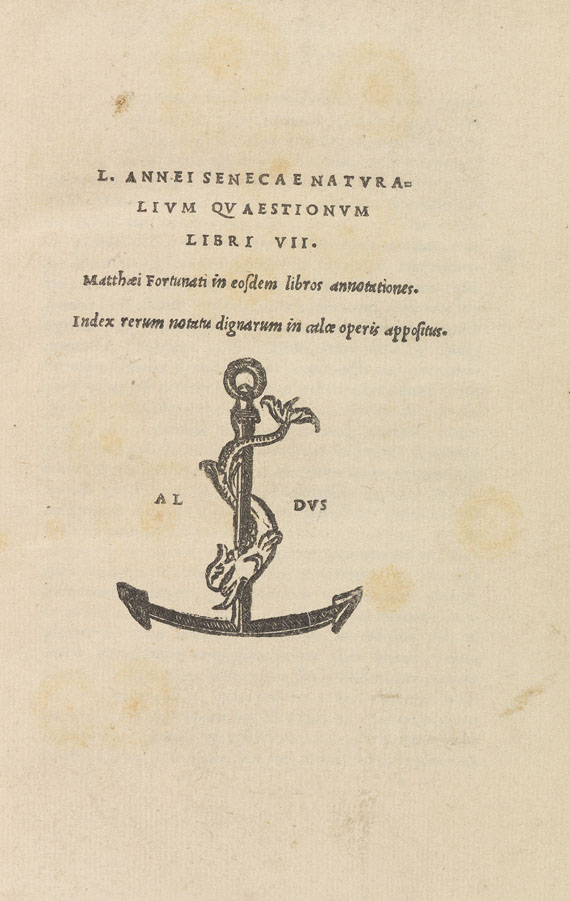Lucius Annaeus Seneca
Opera philosophica. Epistolae [edited by Blasius Romerus]. Treviso: Bernardus de Colonia, 1478
Median folio (325 x 221mm.), 213 leaves (of 214, without final blank), a10 b–h8 i10 k–l8 m10 n–z8 [et]8 aa–bb8, 53 lines, gothic type, start of text with 10-line illuminated initial with leafy marginal extensions (southern German), 3- to 11-line initials in red, initial blank leaf with a page of manuscript from Quintilian on Seneca, early annotations in different hands (some in red ink), contemporary stamped south German calf over wooden boards (plausibly an Augsburg binding), two clasps, a leaf from Epistolae et Evangelia (Plenarium) [German] (Augsburg: Johann Bämler, 20 September 1474) used as front boardliner (though without printed foliation), modern folding box, occasional light staining, rebacked, binding rubbed, lacking both straps
Second edition of the philosophical works of Seneca, based on the 1475 Naples printing by Moravus. This is one of only two books with the name of Bernardus de Colonia, who may have worked previously for Matthias Moravus in Naples (Bernardus died in September 1478 and in his will he mentions his business connections with the Venetian printers Johannes de Colonia and Johannes Manthen). The editor, Blasius Romerus, was a Cistercian monk from Poblet (Catalonia) who also wrote on music theory and was closely associated with Moravus.
LITERATUREISTC is00369000
PROVENANCEinscription on flyleaf dated 1492 (?), "Ex libris patris mei"; Bartholomaeus Amantius of Landsperg [am Lech], Bavaria, sixteenth-century inscription on first leaf of text; Franciscans of Bolzano, inscription at head of first leaf of text; Ned J. Nakles (1931-1999), sale, Christie's New York, 17 April 2000, lot 141
Lucius Annaeus Seneca
Opera philosophica. Epistolae [edited by Blasius Romerus]. Treviso: Bernardus de Colonia, 1478
Median folio (325 x 221mm.), 213 leaves (of 214, without final blank), a10 b–h8 i10 k–l8 m10 n–z8 [et]8 aa–bb8, 53 lines, gothic type, start of text with 10-line illuminated initial with leafy marginal extensions (southern German), 3- to 11-line initials in red, initial blank leaf with a page of manuscript from Quintilian on Seneca, early annotations in different hands (some in red ink), contemporary stamped south German calf over wooden boards (plausibly an Augsburg binding), two clasps, a leaf from Epistolae et Evangelia (Plenarium) [German] (Augsburg: Johann Bämler, 20 September 1474) used as front boardliner (though without printed foliation), modern folding box, occasional light staining, rebacked, binding rubbed, lacking both straps
Second edition of the philosophical works of Seneca, based on the 1475 Naples printing by Moravus. This is one of only two books with the name of Bernardus de Colonia, who may have worked previously for Matthias Moravus in Naples (Bernardus died in September 1478 and in his will he mentions his business connections with the Venetian printers Johannes de Colonia and Johannes Manthen). The editor, Blasius Romerus, was a Cistercian monk from Poblet (Catalonia) who also wrote on music theory and was closely associated with Moravus.
LITERATUREISTC is00369000
PROVENANCEinscription on flyleaf dated 1492 (?), "Ex libris patris mei"; Bartholomaeus Amantius of Landsperg [am Lech], Bavaria, sixteenth-century inscription on first leaf of text; Franciscans of Bolzano, inscription at head of first leaf of text; Ned J. Nakles (1931-1999), sale, Christie's New York, 17 April 2000, lot 141















Testen Sie LotSearch und seine Premium-Features 7 Tage - ohne Kosten!
Lassen Sie sich automatisch über neue Objekte in kommenden Auktionen benachrichtigen.
Suchauftrag anlegen